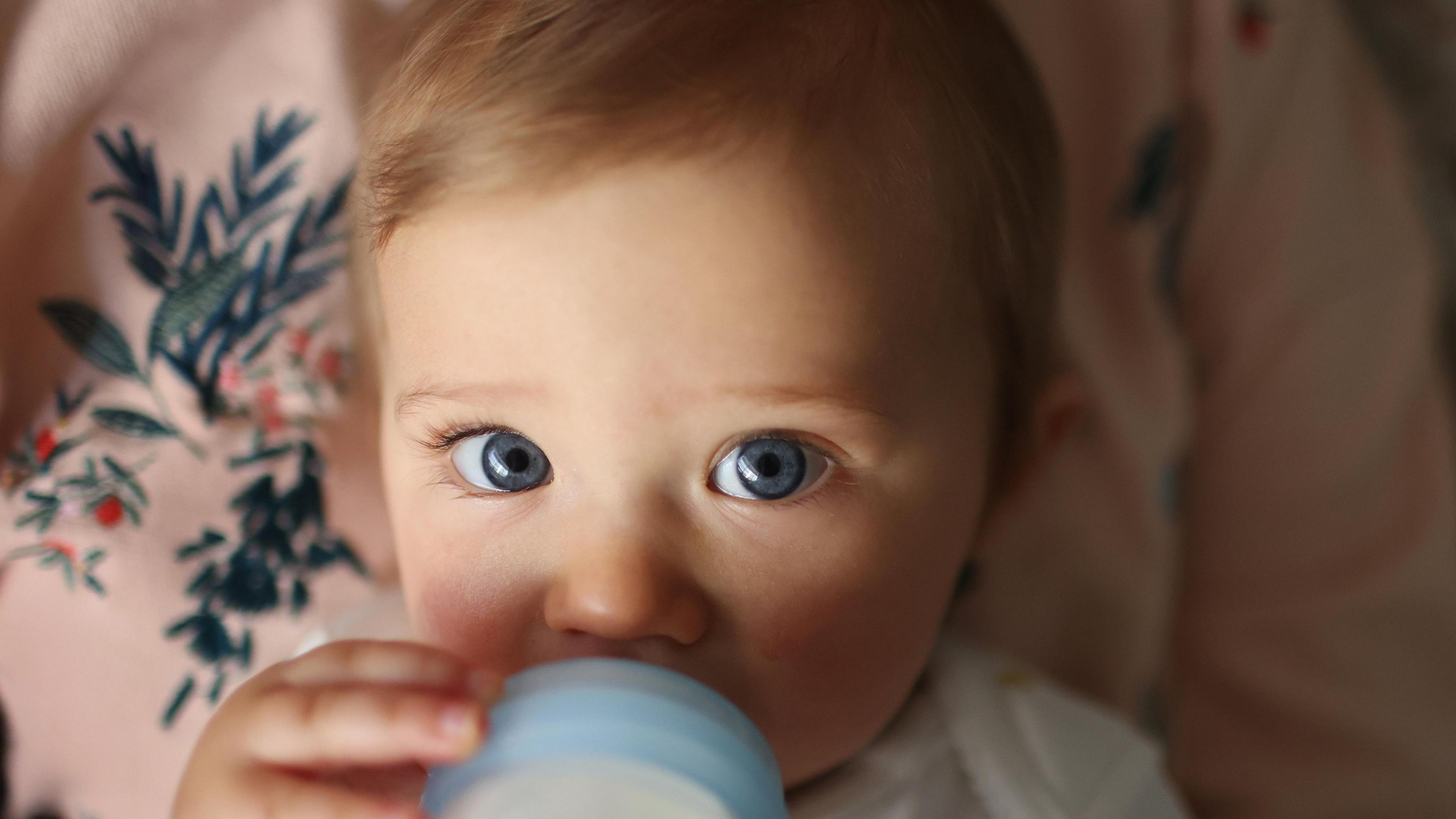'I spend £30 a week on baby milk because I can't breastfeed'

Clare Smyrell says it feels "petty" to ban special offers on formula
- Published
The high price of baby formula makes parents feel "punished" for not breastfeeding, mums and dads have told the BBC.
The cost of baby milk has surged in recent years, while retailers in the UK are not allowed to advertise or offer discounts on infant formula because it might discourage breastfeeding.
Parenting site Mumsnet says this rule has raised the price of formula rather than breastfeeding rates, while the competition watchdog has recommended the ban on price promotions be overturned.
Clare Smyrell, who was not able to breastfeed due to medical reasons, says she spent £30 a week on milk for her baby and resorted to online marketplaces to try to keep costs down.
Her son is now eight months old and she is weaning him off formula but Clare says she felt "like a failure" because she couldn't breastfeed and then had to cope with the additional cost of buying formula.
“You have offers on unhealthy adult food, but you can’t have offers on baby formula which is perfectly healthy. It feels a little bit petty," says Clare from Wolverhampton.
“It almost feels like those who don’t breastfeed are being punished.”
The Competition and Markets Authority (CMA) found prices for formula in the UK jumped between 18% and 36%, depending on the brand, over the two years between December 2021 and December 2023.
Just three companies - Danone, which makes Aptamil and Cow & Gate, and Nestle, which makes SMA, and Kendamil - control over 90% of the UK market.
'How much did that just cost me?'

Natasha Kurzeja says she can't afford to waste a single drop of formula because it is so expensive
Natasha Kurzeja from London says the cost of formula is "extortionate".
When Natasha's 12-week-old son was born, he needed extended stays in hospital, which, she says, made breastfeeding unsustainable.
"It's frustrating when you drop some of the formula because you think, 'gosh, how much did that just cost me?'"
She agrees with Clare about feeling punished for not being able to breastfeed.
"For babies under 12 months you don't have to pay for prescriptions as medicine is something they need. So if I have to feed my baby formula, why are we having to pay through the nose?
"For some of us formula feeding definitely isn’t a choice, but even if it is, fed is best, and mothers don’t need any more shame heaped upon them."
In its interim report into infant formula, external, the CMA suggested better education about formula so that parents are not swayed by undue loyalty due to advertising by a brand.
It also suggested the government could buy formula from a third party to sell at a lower price under NHS branding.

However, a former director of a baby formula manufacturer, who wished to remain anonymous, told the BBC the introduction of an NHS-branded product would create a “race to the bottom”, with companies lowering the quality of their formula to compete for the cheapest price.
He said with any other product, supermarkets would "play hard ball on margins" with suppliers. But with baby milk, parents had fierce loyalty towards their favoured brand so if a supermarket demanded too low a price, a supplier would just take the product somewhere else, he said.
He also claimed some baby milk products were branded and priced differently despite being made in the same factory with the same ingredients.
Baby milk price promotion ban should end, watchdog suggests
- Published8 November 2024
'Too high' baby milk prices to be investigated
- Published20 February 2024
'Money is tight, but I won’t buy a cheaper baby formula'
- Published2 December 2023
Meanwhile, the boss of parenting site Mumsnet said the government was treating baby milk like tobacco, with the restrictions on advertising.
“The way it's been regulated, we totally get that it’s an effort to increase breastfeeding rates. But, let’s be frank, that simply hasn’t worked," said Justine Roberts.
"The UK has some of the lowest breastfeeding rates in the world… and all it’s done is raise the cost of formula for some parents.”
'Verging on discrimination'
James Gilmartin from Manchester has nine-month old twins, one of whom was born with fluid on the lung.
“Getting enough breastmilk for her was quite challenging. It had to be enough for her to gain enough weight to get her off the hospital machines, so it was suggested we use formula,” he says.

The ban on price promotions is "completely disgusting", says James Gilmartin
His partner took a hybrid approach using breast milk and formula, and eventually went with just formula.
“As with a lot of newborns they had digestion issues affecting their bowel movements so we were told to go for a better baby formula - Cow & Gate Comfort which is easier to digest."
An 800g tub cost £14 and with two kids to feed, James and his partner were going through two and a half tubs a week, spending well over £100 a month.
“I find the ban on price promotions completely disgusting and verging on discrimination," says James.
Nelson Dean from London was also taken aback by the high cost of formula.
His son was born in September and is fed on a mixture of formula and breast milk.
Family friends recommended Kendamil, which costs £15 a tin and lasts his son about a week.
If anything, rather than not allowing promotions on formula, Nelson thinks parents should be given help towards the cost.
"With the price of everything else going up, I expected there would be some assistance for essential things like baby milk," he says.
Additional reporting by Bernadette McCague and Rozina Sini.